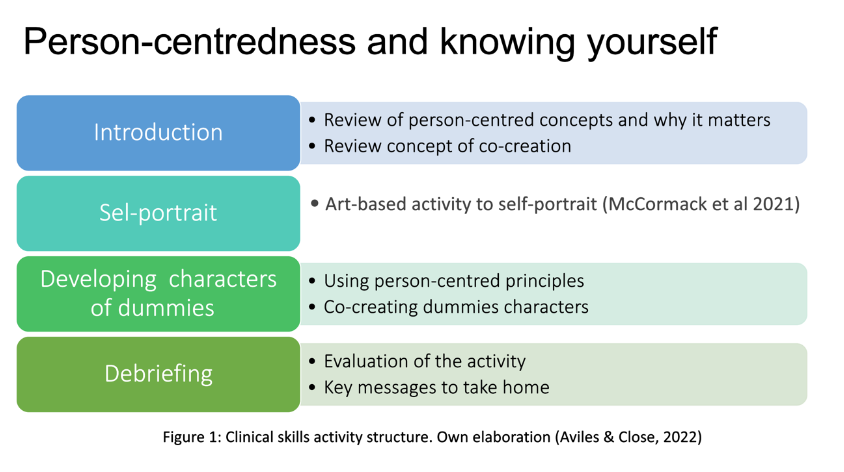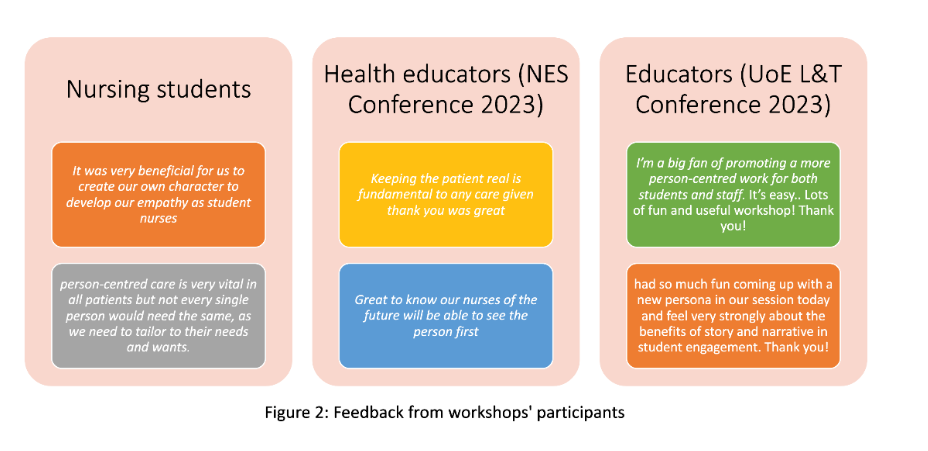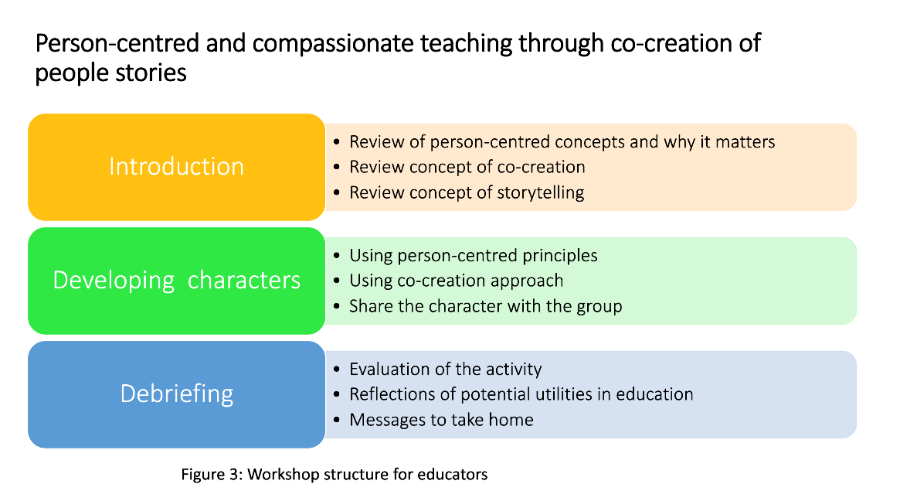
As a registered nurse and academic, I’m passionate about improving people’s lives and health through education and research. As an educator, I constantly explore innovative approaches to make learning meaningful and relevant for students, practitioners and staff alike. Inspired by colleagues across disciplines, I’m leading the incorporation of person-centred and compassionate teaching through co-creation of people stories in higher education.
When I joined the University of Edinburgh as an academic in 2021, we were living in a context of societal crisis during the COVID-19 pandemic. Person-centred and compassionate teaching became not only relevant but was also needed to equip new professionals and citizens to contribute to a better world, as well as for staff to cope with the challenges of responding to a global crisis. In healthcare and education, person-centredness highlights the formation and fostering of relationships between all persons (McCormack et al., 2017↗️). As a result, promoting compassionate environments in higher education involves equally supporting each other and building relationships (Waddington, 2021↗️). Although these principles arguably have been embedded in nursing education and practice for a long time, students often share the challenges of learning and enacting these principles and question what really means to be person-centred? These comments and feedback motivated me to actively look for innovative approaches.
In 2022, whilst attending the Learning and Teaching Conference, I was inspired by Professor Bovil who shared her experiences using co-creation. Co-creation requires a change to the way we think about teaching and how we view students, so that we embrace ways of working that position students as valued and respected contributors with whom we share responsibility (Lubicz-Nawrocka & Bovill, 2021↗️). The session had a great impact on me and inspired me to develop a session for first year students in which they could reflect on who they are to link themselves with the person-centred ethos. The idea resonated with my colleague, Lorraine Close, and together we developed the pilot for the first session (Figure 1).

The session received excellent feedback from students (Figure 2).

It is currently an essential component of Year 1 clinical skills as an exemplar of co-creation, which serves as the foundation for person-centred care teaching in the following years of the nursing programme (BSc Honours – 4 years).
Co-creation of people’s stories beyond nursing
As our teaching activity was received positively by the students, we believed that this approach would be helpful to other teaching practitioners beyond nursing. The workshop has now been presented at two national conferences, and co-creation has been also employed as the core principle in the dissemination. We collaborated with two Year 1 nursing students, who independently recorded a video describing the activity and its impact on their learning. (see video below⬇️)
This video was presented as part of the workshops so that attendees could hear directly from the students about the impact of the activity on their learning. The workshop was first presented at the 2023 National Education Scotland (NES) Annual Virtual Conference 2023 (April 2023↗️); an event for all professional disciplines across health and social care with an interest in education and training, workforce development and digital solutions. We highlighted the impact, particularly for healthcare education, of using co-creation as a transformational tool for future healthcare practitioners aligned with current national standards around person-centred care practices (NMC, 2018↗️). Feedback from attendees (Figure 2) was exciting and we took some of it to our next conference, expanding the scope of the initiative.
The second workshop was delivered at the 2023 Learning and Teaching Conference↗️ at the University of Edinburgh (June 2023). We ran a similar workshop but we expanded the scope to other disciplines beyond healthcare. The focus was on co-creating people stories drawing on person-centred concepts to be employed for educators to better support students and colleagues. The workshop was refined for this new aim (see Figure 3).

During the workshop, we invited educators to co-create fictional characters and reflect on how this activity could be useful for teaching practices. Attendees worked in groups, using pen and paper and the principles of co-creation to create their characters. After 15’, participants shared their stories with the wider group. The activity was once again thought-provoking, as participants developed fictional characters for diverse purposes. Some groups developed characters to support building community and communication, while others developed fictional students’ characters to reflect on their students’ experiences and need for potential additional teaching support. Feedback (Figure 2) was encouraging and suggestions were made related to its potential for teaching but also for community building and staff well-being.
In sum, leading this initiative has been an incredibly rewarding experience. Students, colleagues and educators alike have feedback on the impact of the approach and its potential to support students’ experiences, particularly in the context of societal challenges. We encourage colleagues to try this out perhaps in other fields, using co-creation to foster students’ engagement and improving learning environments that can be person-centred and compassionate.
Acknowledgements: This initiative was a collective effort and my gratitude to my colleagues, Ms Lorraine Close, Dr Catherine Clarissa, Ms Charlotte Taylor and Mr Paul Creigton from Nursing Studies, who made the project and dissemination possible, and the nursing students Nina Ritchie and Neve Paterson for sharing their experiences.
The initiative has been presented in a series of conferences, including the 2023 National Education Scotalnd (NES) Conference (Online) and the Learning and Teaching Conference at the University of Edinburgh.
References:
Lubicz-Nawrocka, T & Bovill, C (2021) ‘Do students experience transformation through co-creating curriculum in higher education?’, Teaching in Higher Education. https://doi.org/10.1080/13562517.2021.1928060↗️
McCormack, B. et al. (2021) Fundamentals of person-centred healthcare practice. Brendan McCormack et al. (eds.). Hoboken, NJ: Wiley-Blackwell.
McCormack, B. (2017) Person-centred practice in nursing and health care theory and practice / edited by Brendan McCormack, Tanya McCance. Second edition. Chichester, West Sussex: Wiley Blackwell.
Waddington, K. (2021). Towards the compassionate university. From golden thread to global impact. Milton: Taylor & Francis Group.
 Lissette Aviles
Lissette Aviles
Dr Lissette Aviles is a lecturer in Nursing Studies and Ethics Lead in Nursing Studies at the School of Health in Social Science↗️, University of Edinburgh. Lissette leads national and international collaborations to improve healthcare education and practice in a person-centred and evidenced-based manner. She hopes that her innovative and novel teaching/learning activities at undergraduate and postgraduate levels can have a real impact on people’s lives and health outcomes. Twitter: @LissetteAvilesR↗️


